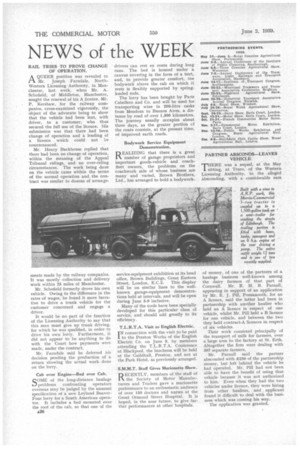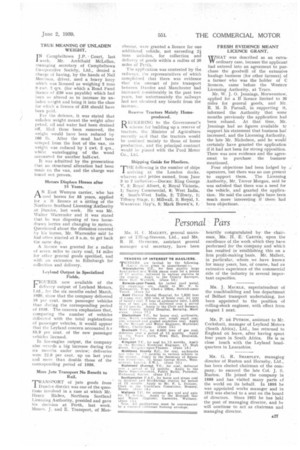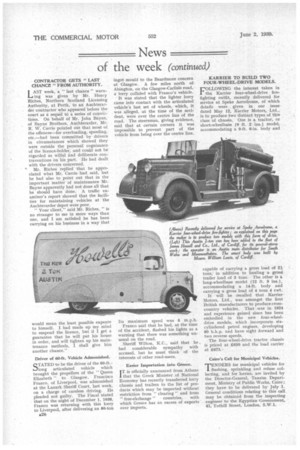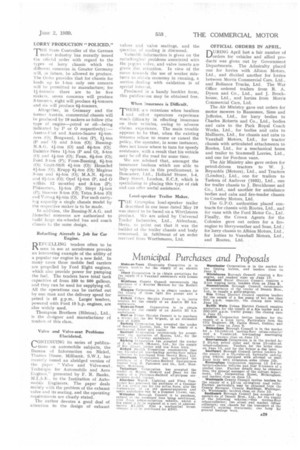NEWS of the WEEK
Page 28

Page 29

Page 30

Page 31

If you've noticed an error in this article please click here to report it so we can fix it.
RAIL TRIES TO PROVE CHANGE OF OPERATION.
A QUEER position was revealed to rt. Mr. Joseph Farndale, NorthWestern Licensing Authonty, in Manchester, last week, when Mr. A. Schofield, of Middleton, Manchester, sought the renewal of his A licence. Mr. P. Kershaw. for the railway companies, cross-examined vigorously, the object of the advocate being to show that the vehicle had been lent, with driver, to a customer, who thus secured the full use of the licence. His submission was that there had been change of operation and a lending of a licence wnich could not be countenanced.
Mr. Henry Backhouse replied that there had been no change of operation, within the meaning of the Appeal Tribunal rulings, andno over-riding circumstances. The work being done on the vehicle came within the terms of the normal operation and the contract was similar to dozens of arrange
ments made by the railway companies. It was mostly collection and delivery work within 25 miles of Manchester.
Mr. Schofield formerly drove his own vehicle. Owing to the difference in the rates of wages, he found it more lucrative to drive a trunk vehicle for the customer concerned and engage a driver.
It would be no part of the function of the Licensing Authority to say that this man must give up trunk driving, for which he was qualified, in order to drive his own lorry. Furthermore, it did not appear to be anything to do with the Court how payments were made, under the contract.
Mr. Farndale said he deferred his decision pending the production of a return showing the actual work done on the lorry.
Cab over Engine—Bed over Cab. QOME of the long-distance haulage problems confronting operators overseas may be judged by the unusual specification of a new Leyland BeaverFour lorry for a South American operator. It includes a bed mounted over the roof of the cab, so that one of the £26 drivers can rest en route during long runs. The bed is housed under a canvas covering in the form of a tent, and, to provide greater comfort, the bodywork above the cab on which it rests is flexibly supported by springloaded rods.
The lorry has been bought by Paris Cabellero and Co. and will be used for transporting wine in 200-litre casks from Mendoza to Buenos Aires, a distance by road of over L900 kilometres. The journey usually occupies about three days, as the greater portion cf the route consists, at the present time, of improved earth roads.
Bodywork Service Equipment Demonstration.
REALIZING that there is a great number of garage proprietors and important goods-vehicle and coachfleet owners, the problems on the coachwork side of whose business are many and varied, Brown Brothers, Ltd., has arranged to hold a bodywork
service-equipment exhibition at its head office, Brown Buildings, Great Eastern Street, London, E.C.2. This display will be on similar lines to the wellknown garage-equipment demonstrations held at intervals, and will be open during June 5-9 inclusive.
Many of the tools have been specially developed for this particular class of service, and should add greatly to its efficiency.
T.L.R.T.A. Visit to English Electric. I N connection with the visit to be paid to the Preston Works of the English Electric Co. on June 9, by members attending the T.L.R.T.A. Conference at Blackpool, the luncheon will be held at the Guildhall, Preston, and not at the Park Hotel, as previously arranged.
S.M.M.T. Staff Gives Marionette Show.
RECENTLY, members of the staff of the Society of Motor Manufacturers and Traders gave a marionette performance to an enthusiastic audience of over 150 doctors and nurses at the Great Ormond Street Hospital. It is hoped, in the near future, to give further performances at other hospitals.
PARTNER ABSCONDS—LEAVES VEHICLE.
THERE was a sequel, at the May 1 sitting, at Truro, of the Western Licensing Authority, to the alleged absconding, with a considerable sum
of money, of one of the partners of a haulage business well-known among the dairy farmers of that part of Cornwall. Mr. R. M. B. Parnall, appearing in support of an application by Mr. E. J. Pill, Ponsanooth, for an A licence, said the latter had been in partnership with another haulier who held an A licence in respect of one vehicle, whilst Mr. Pill held a B licence for one vehicle, and between the two they held contract-A licences in respect of six vehicles.
Their work consisted principally of the transport of milk for farmers, over a large area to the factory at St. Erth. Altogether the firm were dealing with 397 separate farmers.
Mr. Pamall said the partner absconded with £250 of the partnership money, but left behind the vehicle he had operated. Mr. Pill had not been able to have the benefit of using that vehicle because it was not authorized to him. Even when they had the two vehicles under licence, they were hiring from other hauliers, and applicant found it difficult to deal with the business which was coming his way.
The application was granted. TRUE MEANING OF UNLADEN WEIGHT.
IN Campbeltown J.P. • Court, last 1 week, Mr. Archibald McLellan, managing secretary of Campbeltown Co-operative Society, Ltd., denied a charge of having, by the hands of Neil Morrison, driver, used a heavy lorry which was licensed as weighing 2 tons
9 cwt. 2 qrs. (for which a Road Fund licence of 30 was payable) which had been so altered as to increase its unladen weight and bring it into the class for which a licence of 235 should have been paid. For the defence, it was stated that unladen weight meant the weight after petrol, oil and water had been drained off, Had these • been removed, the weight would have been reduced by 160 lb. After the mud had been scraped from the foot of the van, its
weight was reduced by 1 cwt. 2 qrs., whilst waterlogging of the wood accounted for another half-cwt.
It was admitted by the prosecution that no structural alteration had been made on the van, and the charge was lound not proven, Motors Displace Horses after 55 Years.
AN East Wemyss carrier, who has used horses for 55 years, applied for a B licence at a sitting of the Northern Scotland Licensing Authority at Dundee, last week. He was Mr. Walter Warrender and it was stated that he was disposing of two horsedrawn lorries and changing to nwtors. Questioned about the distantes covered by hEs horses, Mr. •Warrender said he had often .started at 3 a.m. to get back. the same day. A licence was granted for a radius of seven miles to carry coal, 14 miles for other general goods specified, and with an extension to Edinburgh for collection and delivery.
Leyland Output in Specialized Fields.
RES now available of the delivery output of Leyland Motors, Ltd., for the six months ended March, 1939, shaw that the company delivered 10 per rent, more passenger vehicles than during the corresponding period of 1938. The concern emphasizes that, comparing the number of vehicles delivered with the total registrations of passenger vehicles, it would appear that the Leyland concern accounted fc r 55.9 per cent, of the new passenger vehicles licensed.
In fire-engine output, the company also records a big increase during the six months under review; deliveries were 22.8 per cent, up on last year and more than double those of the corresponding period of 1936.
More Jute Transport No Benefit to RaiI.
TRANSPORT of jute goods from • I Dundee district was one of the questions involved in a case at which Mr. Henry Riches, Northern Scotland Licensing Authority, presided and gave his decision at Perth, last week. Messrs. J. and E. Transport, of Man chester, were granted a licence for one additional vehicle, not exceeding 2j tons unladen, for collection and delivery of goods within a radius of 30 miles of Perth. •
The a.ppllcation was contested by the railways, the representatives of which complained that there was evidence that the amount of jute transport between Dundee and Manchester had increased considerably in the past two years, but unfortunately the railways had not obiained any benefit from the increase.
Reserve Tractors Mainly Home. produced.
REFERR [NG to the Government's scheme for building up a reserve of tractors, the Minister of Agriculture recently sa:d that the tractors would be confined mainly to those of home production, and the, principal .contract would be placed with the Ford Motor Co., Ltd.
Shipping Guide for Hauliers.
THE following is the number of ships arriving at the London docks, wharves and jetties named, from June 3 to 7 inclusive:—Docits: King George V, 3; Royal Albert, 4; Royal Victoria, 1; Surrey Commercial, 8; West India, 4; South-West India, 2; Tilbury, 3; Tilbury Stage, 1; Millwall, 3; Royal, 1. WmAftyEs: Hay's, 5; Mp.rk Brown* 1.
FRESH EVIDENCE MEANT LICENCE GRANT.
WHAT was described as an extraIT ordinary case, because the applicant had entered into an agreement to purchase the goodwill of the extensive haulage business (for other farmers) of a farmer who was the holder of C licences, came before the Western Licensing Authority, at Truro.
Mr. W. J. 0. Jennings, Morwenstow, applied for a B licence limited to 30 miles for general goods, and Mr. R. M. B. Parnall, in supporting it, informed the Authority that some months previously the application had been refused. At that time, Mr. Jennings had no figures available tc support his statement that business had increased, and the Licensing Authority, the late Mr. Nicholson, said he would certainly have granted the application if it had not been for strong opposition. There was now evidence and the agreement to purchase the businest mentioned.
Four objections had been lodged by operators, but there was no one present to support them. The Licensing Authority, Mr. Trevor Morgan, said he was satisfied that there was a need for the vehicle, and granted the application. He .said the case might have been much ,more interesting if there had been objections. CONTRACTOR GETS "LAST CHANCE " FROM AUTHORITY.
AST week, a "last chance" warn ing was given by Mr. Henry Riches, Northern Scotland Licensing Authority, at Perth, to an Auchterarder contractor who appeared before the court as a sequel to a series of convictions. On behalf of Mr. John Bayne, of Bayne Brothers, Auchterarder, Mr. R. W. Currie pointed out that most of the offences—for overloading, speeding, etc.—had been committed by drivers in circumstances which showed they were outside the personal cognizance of the licence-holder, and could not be regarded as wilful and deliberate contraventions on his part. He had dealt with the drivers concerned.
' Mr. Riches replied that he appreciated what Mr. Currie .had said, but he had also to point out that in the important matter of maintenance Mr. Bayne apparently had not done all that he should have done. A traffic examiner's report showed that the facilities for maintaining vehicles at the Auchterarder depot were poor.
" Your client," said Mr. Riches, "IS no stranger to me in more ways than one, and I am satisfied he has been carrying on his business in a way that would mean the least possible expellee to himself. I had made up my mind to suspend the licence, but if I get a guarantee that he will put his house in order, and will tighten up his maintenance methods, I shall give him another chance."
Driver of 60-ft. Vehicle Admonished.
STATED to be the driver of the 60-ft.long articulated vehicle which brought the propellers of the "Queen Elizabeth" to Glasgow, Francisco Franco, of Liverpool, was admonished at the Lanark Sheriff Court, last week, on a charge of careless driving. He pleaded not guilty. The Fiscal stated that on the night of December 1, 1938, Franco was returning with this lorry to Liverpool, after delivering an 80-ton
ingot mould to the Beardmore concern at Glasgow. A few miles north of • Abington, on the Glasgow-Carlisle road, a lorry collided with Franco's vehicle.
It was stated that the lighter lorry came into contact with the articulated vehicle's last set of wheels, which, it was alleged, at the time of the accident, were over the centre line of the road. The steersman, giving evidence, said that at certain corners it was impossible to prevent part of the vehicle from being over the centre line.
Its maximum speed was 5 m.p.h.
Franco said that he had, at the time of the accident, flashed his lights as a warning that there was something unusual on the road.
Sheriff Wilton, KC., said that he had considerable sympathy with accused, but he must think of the interests of other road-users.
Easier Importation into Greece.
I T is officially announced from Athens that the Greek Minister of National Economy has recently transferred lorry chassis and trailers to the list of products which may be imported without restriction from " clearing" and from " free-exchange " countries, with which Greece has an excess of exports over imports. KARRIER TO BUILD TWO FOUR-WHEEL-DRIVE MODELS.
FOLLOWTING the interest taken in the Karrier four-wheel-drive firefighting outfit, recently delivered for service at Speke Aerodrome, of which details were given in our issue dated May 12, Karrier Motors, Ltd., is to produce two distinct types of this class of chassis. One is a tractor, or short-wheelbase (9 ft. 2 ins.) model, accommodating a 9-ft. 6-in. body and
capable of carrying a gross load of 21 tons, in addition to hauling a gross trailer load of 3 tons. The other is a long-wheelbase model (12 ft. 9 ins.), accommodating a 14-ft. body and carrying a gross load of 4 tons 4 cwt.
It will be recalled that Karrier Motors, Ltd., was amongst the first British manufacturers to produce crosscountry vehicles. That was in 1924 and experience gained since has been embodied in the new four-wheeldrive models, which incorporate sixcylindered petrol engines, developing 80 b.h.p. and have eight forward and two reverse speeds.
The four-wheel-drive tractor chassis is priced at £650 and the load carrier at £675..
Cairo's Call for Municipal Vehicles.
TENDERS for municipal vehicles for I flushing, sprinkling and refuse collecting, and for lorries, are invited by the Director-General, Tanzini Department, Ministry of Public Works, Cairo; they have to be delivered by July 1. General conditions relating to this call may be obtained from the inspecting engineer to the Egyptian Government, 41. Tothill Street, London, S.W.1. LORRY PRODUCTION "POLICED."
THE State Controller of the German motor industry has recently issued the official order with regard to the types of lorry chassis which the different concerns in Greater Germany will, in future, be allowed to produce. The Order provides that for chassis for loads up to 1-ton only one concern will he permitted to manufacture; for 14-tonners there are to be five makers, seven concerns will produce 3-tonners, eight will produce 44-tonners and six will produce 64-tanners.
Altogether, in Germany and the former Austria, commercial chassis will be produced by 19 makers as follow (the type of engine—petrol or oil—being indicated by P or 0 respectively):— Austro-Fiat and Austro-Saurer 44-tonners (0); Borgward, 1-ton (P), 14-ton (P and 0) and 3-ton (0); BussingN.A.G. 44-ton (0) and 64-ton (0); Daimler-Hens 14-ton (P and 0), 3-ton (0) and 44-ton (0); Faun, 64--ton (0); Ford 3-ton (P); Fross-Bussing, 647ton (0); G raf t-Stift 41-ton (0); Henschel 41-ton (0); Krupp 64-ton (0); Magirus 3-ton and 44-ton (0); M.A.N. 44-ton and 61-ton (0); Opel 14-ton (P, and 0 within 12 months) and 3-ton (P); Phanomen, 14-ton (P); Steyr 14-ton P); Stoewer 3-ton (0); Tatra 3-ton (0) and Vomag 64-ton (0). For each carrying capacity a single chassis model by the respective maker is to be made.
In addition, the Bussing-N.A.G. and Henschel concerns are authorized to build large six-wheeled bus and coach chassis to the same design.
Refuelling Aircraft is job for Car Engine.
REFUELLING tenders often to he seen ia use at aerodromes provide an interesting example of the utility of a popular car engine in a new field. In ninny cases these mobile fuel carriers are propelled by Ford Eight engines, which also provide power for pumping the fuel, The tenders have total tank capacities of from 350 to 500 gallons, and they can be used for supplying oil. All the operations can be carried out by one man and the delivery speed for petrol is 45 g.p.m. Larger tenders, powered with Ford 10 h.p. engines, are also widely used.
Thompson Brothers (Bilston), Ltd.. is the designer and manufacturer of tenders of this class.
Valve and Valve-seat Problems Elucidated.
CONTINITING its series of publications on automobile subjects, the Bureau of Information on 'Nickel, Thames house, Millbank, S.W.1, has recentiy issued an abridged version of the paper " Valve and Valve-seat Technique for Automobile and Aero Engines," presented by F. R. Banks, M.I.A.E., to the Institution of Automobile Engineers. The paper deals mainly with the problem of the exhaust valve and its seating, and the operating requirements are clearly stated.
The author devotes a good deal of attention to the design of exhaust valves and valve seatings, and the quesIim: of cooling is discussed.
Valuable information is given on the metallurgical problems associated witn the poppet aive, and valve inserts are given due attention. In view of the move towards the use of weaker mixtures to obtain economy in running, a section dealing with oxidation is of special inter :-st.
Produced in a handy booklet form, this publication may be obtained free.
When Insurance is Difficult.
THERE a:T. occasions when hauliers 1 and other operators experience much difficaty in effecting insurance on their of hides, owing to adverse claims experience. The main trouble appears to be that, when the existing insurers refuse to renew or cancel the policy, the operator, in some instances, does not know where to turn for speedy assistance, with a result that his vehicle may be off the road for some time.
We are advised that, amongst the insurance brokers which are able to help operators in this predicament, is Boncaster, Ltd., Holland House, 1-4, Bury Street, London, E.C.3, which is specializing in placing this type of risk and can offer useful assistance.
Loud-speaker Trailer Maker.
TilE tirampian loud-speaker trailer I described in our issue dated May 19 was stated To he based on a VV.orthmore product. We are asked by Uuiversal Trailer Industries, Ltd., Aldenham, Herts. to point out that it was the builder of the trailer chassis and body concerned, in fulfilment of an order recei ved horn Worthmores, Ltd.
OFFICIAL ORDERS IN APRIL.
DURING April last a fair number of orders for vehicles and allied products' was given out by Government Departments. The Admiralty placed one for lorries with Albion Motors, Ltd., and divided another for lorries between Morris Commercial Cars, Ltd., and Reliance Trucks, Ltd. The War Office ordered trailers from R. A. Dyson and Co., Ltd., and J. Brockhouse, Ltd., and lorries from Morris Commercial Cars, Ltd.
The Air Ministry gave out orders for motor mowers to Ransomes, Sims and Jefferies, Ltd., for lorry bodies to Charles Roberts and Co., Ltd., bodies and cabs to the Park Royal Coach Works, Ltd., for bodies and cabs to Mulliners, Ltd., for chassis and cabs to Vauxhall Motors, Ltd., for tractor chassis with articulated attachments to Rootes, Ltd., for a mechanical horse and trailer to Scamrnell Lorries, Ltd., and one for Fordson vans.
The Air Ministry also gave orders for petrol-driven tractors to W. J. Reynolds (Motors), Ltd., and Tractors (London), Ltd., one for trailers to Taskers of Andover (1932), Ltd., one for trailer chassis to J. Brockhouse and Co., Ltd., and another for ambulance bodies and cabs and fire-tender chassis to Crossley Motors, Ltd.
The G.P.O. authorities placed contracts for chassis with Rootes, Ltd., and for vans with the Ford Motor Co., Ltd. Finally, the Crown Agents for the Colonies gave out orders for a fireengine to Merryweather and Sons. Ltd.; for lorry chassis to Albion Motors, Ltd., for lorries to Vauxhall Motors, Ltd., and Rootes, Ltd.












































































